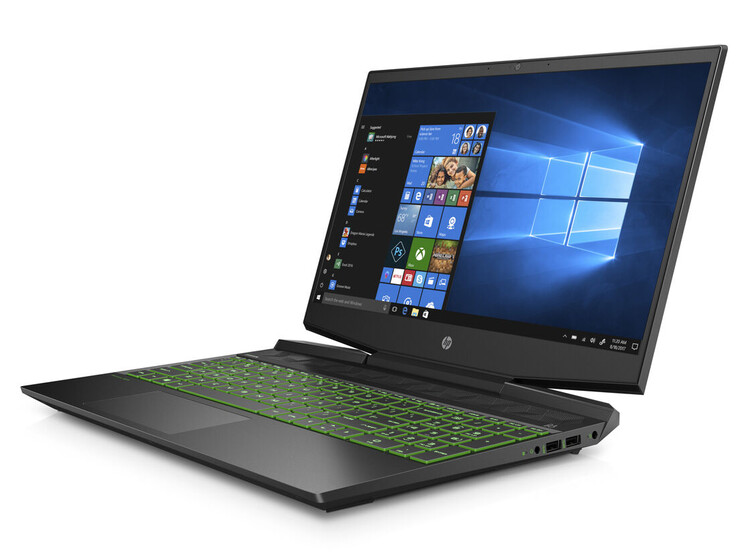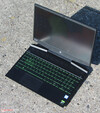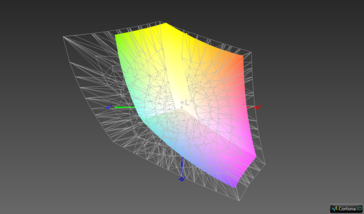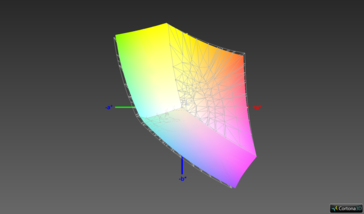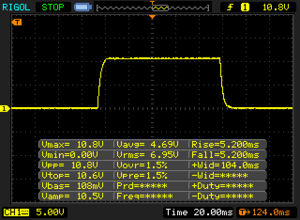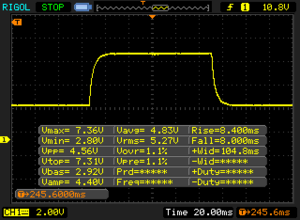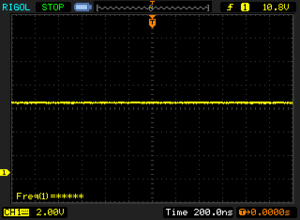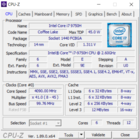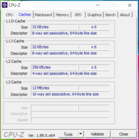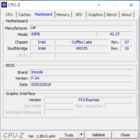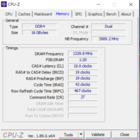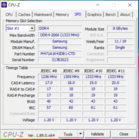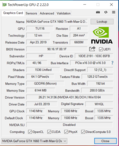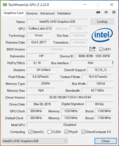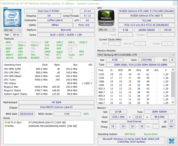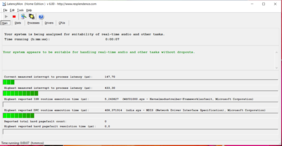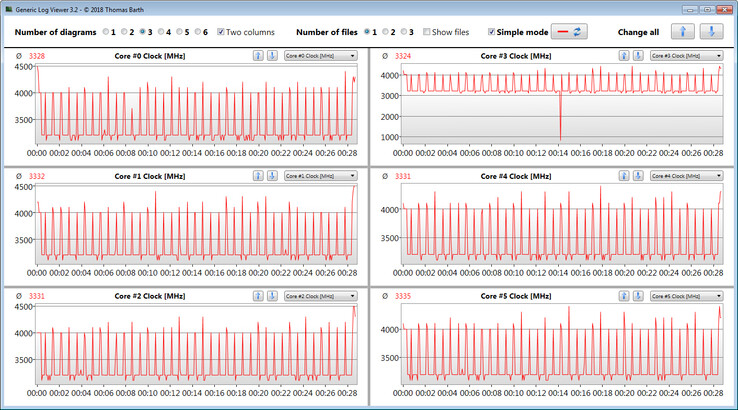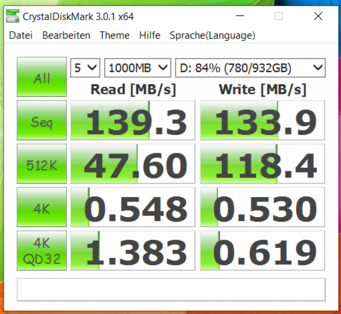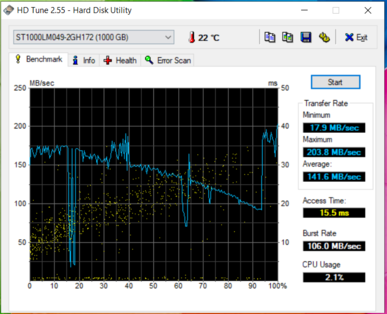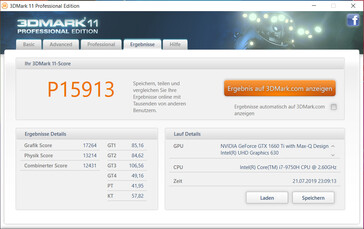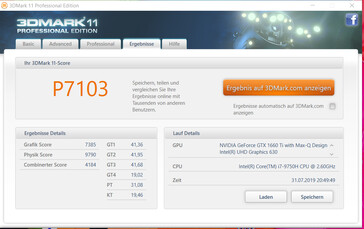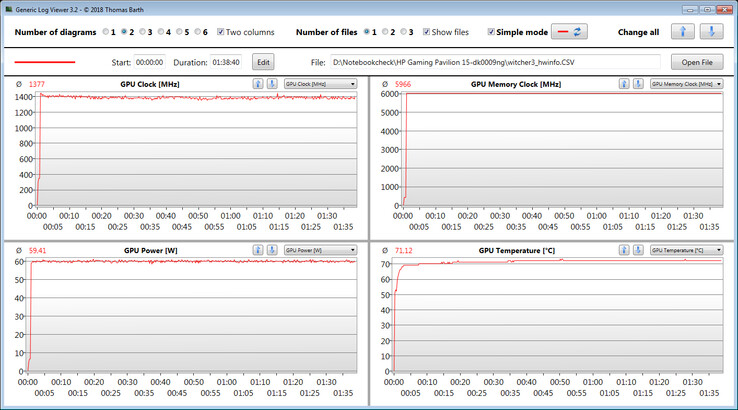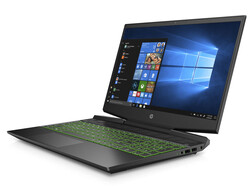Breve Análise do Portátil HP Gaming Pavilion 15: Um portátil de jogos poderoso, porém, agradavelmente silencioso
Os Top 10
» Os Top 10 Portáteis Multimídia
» Os Top 10 Portáteis de Jogos
» Os Top 10 Portáteis Leves para Jogos
» Os Top 10 Portáteis Acessíveis de Escritório/Empresariais
» Os Top 10 Portáteis Premium de Escritório/Empresariais
» Os Top 10 dos Portáteis Workstation
» Os Top 10 Subportáteis
» Os Top 10 Ultrabooks
» Os Top 10 Conversíveis
» Os Top 10 Tablets
» Os Top 10 Smartphones
» A melhores Telas de Portáteis Analisadas Pela Notebookcheck
» Top 10 dos portáteis abaixo dos 500 Euros da Notebookcheck
» Top 10 dos Portáteis abaixo dos 300 Euros
| SD Card Reader | |
| average JPG Copy Test (av. of 3 runs) | |
| Média da turma Gaming (20 - 210, n=63, últimos 2 anos) | |
| CUK Model Z GK5CQ7Z (Toshiba Exceria Pro SDXC 64 GB UHS-II) | |
| HP Gaming Pavilion 15-dk0009ng (Toshiba Exceria Pro SDXC 64 GB UHS-II) | |
| Dell G5 15 5590 (Toshiba Exceria Pro SDXC 64 GB UHS-II) | |
| Medion Erazer X6805-MD61085 (Toshiba Exceria Pro SDXC 64 GB UHS-II) | |
| maximum AS SSD Seq Read Test (1GB) | |
| Média da turma Gaming (25.5 - 261, n=60, últimos 2 anos) | |
| CUK Model Z GK5CQ7Z (Toshiba Exceria Pro SDXC 64 GB UHS-II) | |
| HP Gaming Pavilion 15-dk0009ng (Toshiba Exceria Pro SDXC 64 GB UHS-II) | |
| Medion Erazer X6805-MD61085 (Toshiba Exceria Pro SDXC 64 GB UHS-II) | |
| Dell G5 15 5590 (Toshiba Exceria Pro SDXC 64 GB UHS-II) | |
| Networking | |
| iperf3 transmit AX12 | |
| Medion Erazer X6805-MD61085 | |
| Dell G5 15 5590 | |
| HP Gaming Pavilion 15-dk0009ng | |
| CUK Model Z GK5CQ7Z | |
| Asus ROG Zephyrus G15 GA502DU | |
| Lenovo Legion Y530-15ICH | |
| iperf3 receive AX12 | |
| Medion Erazer X6805-MD61085 | |
| Dell G5 15 5590 | |
| CUK Model Z GK5CQ7Z | |
| HP Gaming Pavilion 15-dk0009ng | |
| Asus ROG Zephyrus G15 GA502DU | |
| Lenovo Legion Y530-15ICH | |
| |||||||||||||||||||||||||
iluminação: 86 %
iluminação com acumulador: 346 cd/m²
Contraste: 821:1 (Preto: 0.42 cd/m²)
ΔE ColorChecker Calman: 1.3 | ∀{0.5-29.43 Ø4.76}
calibrated: 1.1
ΔE Greyscale Calman: 1.2 | ∀{0.09-98 Ø5}
94.9% sRGB (Argyll 1.6.3 3D)
60.5% AdobeRGB 1998 (Argyll 1.6.3 3D)
65.8% AdobeRGB 1998 (Argyll 3D)
95.1% sRGB (Argyll 3D)
64.2% Display P3 (Argyll 3D)
Gamma: 2.31
CCT: 6476 K
| HP Gaming Pavilion 15-dk0009ng IPS, 1920x1080, 15.6" | CUK Model Z GK5CQ7Z IPS, 1920x1080, 15.6" | Dell G5 15 5590 IPS, 1920x1080, 15.6" | Asus ROG Zephyrus G15 GA502DU IPS, 1920x1080, 15.6" | Lenovo Legion Y530-15ICH IPS, 1920x1080, 15.6" | Medion Erazer X6805-MD61085 IPS, 1920x1080, 15.6" | |
|---|---|---|---|---|---|---|
| Display | -1% | -38% | -37% | -3% | -7% | |
| Display P3 Coverage (%) | 64.2 | 64.5 0% | 39.26 -39% | 40.33 -37% | 62.5 -3% | 63.8 -1% |
| sRGB Coverage (%) | 95.1 | 93 -2% | 59.1 -38% | 60.6 -36% | 93 -2% | 82.4 -13% |
| AdobeRGB 1998 Coverage (%) | 65.8 | 65.7 0% | 40.56 -38% | 41.69 -37% | 63.8 -3% | 60.3 -8% |
| Response Times | 1% | -181% | -138% | 2% | -158% | |
| Response Time Grey 50% / Grey 80% * (ms) | 16.4 ? | 13.6 ? 17% | 45 ? -174% | 34 ? -107% | 15 ? 9% | 38.4 ? -134% |
| Response Time Black / White * (ms) | 10.4 ? | 12 ? -15% | 30 ? -188% | 28 ? -169% | 11 ? -6% | 29.2 ? -181% |
| PWM Frequency (Hz) | 21280 ? | 20490 ? | ||||
| Screen | -44% | -181% | -117% | -70% | -91% | |
| Brightness middle (cd/m²) | 345 | 306.8 -11% | 234 -32% | 240.1 -30% | 305 -12% | 270 -22% |
| Brightness (cd/m²) | 324 | 309 -5% | 219 -32% | 231 -29% | 284 -12% | 269 -17% |
| Brightness Distribution (%) | 86 | 87 1% | 82 -5% | 85 -1% | 83 -3% | 86 0% |
| Black Level * (cd/m²) | 0.42 | 0.38 10% | 0.17 60% | 0.34 19% | 0.52 -24% | 0.32 24% |
| Contrast (:1) | 821 | 807 -2% | 1376 68% | 706 -14% | 587 -29% | 844 3% |
| Colorchecker dE 2000 * | 1.3 | 3.16 -143% | 8.6 -562% | 4.2 -223% | 3.63 -179% | 5.1 -292% |
| Colorchecker dE 2000 max. * | 2.8 | 6.05 -116% | 17.49 -525% | 17.8 -536% | 8.18 -192% | 9.25 -230% |
| Colorchecker dE 2000 calibrated * | 1.1 | 2.4 -118% | 4.06 -269% | 4.09 -272% | 1.31 -19% | 3.25 -195% |
| Greyscale dE 2000 * | 1.2 | 2.3 -92% | 8.55 -613% | 2.8 -133% | 4.77 -297% | 4.16 -247% |
| Gamma | 2.31 95% | 2.17 101% | 3.02 73% | 2.2 100% | 2.54 87% | 2.53 87% |
| CCT | 6476 100% | 6557 99% | 7802 83% | 6925 94% | 7500 87% | 6860 95% |
| Color Space (Percent of AdobeRGB 1998) (%) | 60.5 | 60 -1% | 37 -39% | 38.4 -37% | 59 -2% | 54 -11% |
| Color Space (Percent of sRGB) (%) | 94.9 | 92.6 -2% | 59 -38% | 60.4 -36% | 93 -2% | 82 -14% |
| Média Total (Programa/Configurações) | -15% /
-30% | -133% /
-154% | -97% /
-105% | -24% /
-49% | -85% /
-84% |
* ... menor é melhor
Exibir tempos de resposta
| ↔ Tempo de resposta preto para branco | ||
|---|---|---|
| 10.4 ms ... ascensão ↗ e queda ↘ combinadas | ↗ 5.2 ms ascensão | |
| ↘ 5.2 ms queda | ||
| A tela mostra boas taxas de resposta em nossos testes, mas pode ser muito lenta para jogadores competitivos. Em comparação, todos os dispositivos testados variam de 0.1 (mínimo) a 240 (máximo) ms. » 27 % de todos os dispositivos são melhores. Isso significa que o tempo de resposta medido é melhor que a média de todos os dispositivos testados (20.1 ms). | ||
| ↔ Tempo de resposta 50% cinza a 80% cinza | ||
| 16.4 ms ... ascensão ↗ e queda ↘ combinadas | ↗ 8.4 ms ascensão | |
| ↘ 8 ms queda | ||
| A tela mostra boas taxas de resposta em nossos testes, mas pode ser muito lenta para jogadores competitivos. Em comparação, todos os dispositivos testados variam de 0.165 (mínimo) a 636 (máximo) ms. » 30 % de todos os dispositivos são melhores. Isso significa que o tempo de resposta medido é melhor que a média de todos os dispositivos testados (31.4 ms). | ||
Cintilação da tela / PWM (modulação por largura de pulso)
| Tela tremeluzindo / PWM não detectado | |||
[pwm_comparison] Em comparação: 53 % de todos os dispositivos testados não usam PWM para escurecer a tela. Se PWM foi detectado, uma média de 8016 (mínimo: 5 - máximo: 343500) Hz foi medida. | |||
| Geekbench 3 | |
| 32 Bit Multi-Core Score | |
| HP Gaming Pavilion 15-dk0009ng | |
| Média Intel Core i7-9750H (21185 - 23587, n=8) | |
| Dell G5 15 5590 | |
| 32 Bit Single-Core Score | |
| HP Gaming Pavilion 15-dk0009ng | |
| Média Intel Core i7-9750H (4137 - 4428, n=8) | |
| Dell G5 15 5590 | |
| Mozilla Kraken 1.1 - Total | |
| Dell G5 15 5590 (Edge 44) | |
| HP Gaming Pavilion 15-dk0009ng (Edge 44) | |
| Média Intel Core i7-9750H (845 - 1713, n=54) | |
| Lenovo Legion Y530-15ICH | |
| Média da turma Gaming (397 - 674, n=124, últimos 2 anos) | |
| Octane V2 - Total Score | |
| Média da turma Gaming (87588 - 139447, n=37, últimos 2 anos) | |
| Lenovo Legion Y530-15ICH | |
| HP Gaming Pavilion 15-dk0009ng (Edge 44) | |
| Média Intel Core i7-9750H (22874 - 39708, n=47) | |
| Dell G5 15 5590 (Edge 44) | |
| Asus ROG Zephyrus G15 GA502DU (Edge 44.17763.1.0) | |
| JetStream 1.1 - Total Score | |
| Média da turma Gaming (515 - 669, n=12, últimos 2 anos) | |
| HP Gaming Pavilion 15-dk0009ng (Edge 44) | |
| Média Intel Core i7-9750H (212 - 280, n=47) | |
| Dell G5 15 5590 (Edge 44) | |
| Asus ROG Zephyrus G15 GA502DU (Edge 44.17763.1.0) | |
| Lenovo Legion Y530-15ICH | |
* ... menor é melhor
| PCMark 7 Score | 6847 pontos | |
| PCMark 8 Home Score Accelerated v2 | 4362 pontos | |
| PCMark 8 Creative Score Accelerated v2 | 4155 pontos | |
| PCMark 8 Work Score Accelerated v2 | 5608 pontos | |
| PCMark 10 Score | 5583 pontos | |
Ajuda | ||
| HP Gaming Pavilion 15-dk0009ng Samsung SSD PM981 MZVLB256HAHQ | CUK Model Z GK5CQ7Z Intel SSD 660p 2TB SSDPEKNW020T8 | Dell G5 15 5590 KBG30ZMS128G | Asus ROG Zephyrus G15 GA502DU Intel SSD 660p SSDPEKNW512G8 | Lenovo Legion Y530-15ICH Samsung SSD PM981 MZVLB256HAHQ | Medion Erazer X6805-MD61085 Samsung PM961 MZVLW256HEHP | Média Samsung SSD PM981 MZVLB256HAHQ | |
|---|---|---|---|---|---|---|---|
| CrystalDiskMark 5.2 / 6 | 37% | -56% | -6% | 2% | -9% | 72% | |
| Write 4K (MB/s) | 100 | 134.4 34% | 64.3 -36% | 132.2 32% | 108.9 9% | 90.3 -10% | 116.1 ? 16% |
| Read 4K (MB/s) | 31.39 | 56.8 81% | 29.3 -7% | 55.5 77% | 40.23 28% | 38.98 24% | 189.5 ? 504% |
| Write Seq (MB/s) | 1308 | 1742 33% | 131.1 -90% | 986 -25% | 1390 6% | 1095 -16% | 1409 ? 8% |
| Read Seq (MB/s) | 1083 | 1687 56% | 776 -28% | 1318 22% | 964 -11% | 777 -28% | 1624 ? 50% |
| Write 4K Q32T1 (MB/s) | 362.9 | 535 47% | 96.8 -73% | 220.3 -39% | 314.2 -13% | 302.7 -17% | 360 ? -1% |
| Read 4K Q32T1 (MB/s) | 425.7 | 639 50% | 198.6 -53% | 315.5 -26% | 369.2 -13% | 352.2 -17% | 396 ? -7% |
| Write Seq Q32T1 (MB/s) | 1411 | 1903 35% | 127.8 -91% | 987 -30% | 1506 7% | 1265 -10% | 1492 ? 6% |
| Read Seq Q32T1 (MB/s) | 3240 | 1849 -43% | 1044 -68% | 1416 -56% | 3446 6% | 3389 5% | 3313 ? 2% |
| 3DMark 06 Standard Score | 38536 pontos | |
| 3DMark 11 Performance | 15913 pontos | |
| 3DMark Ice Storm Standard Score | 117976 pontos | |
| 3DMark Cloud Gate Standard Score | 33027 pontos | |
| 3DMark Fire Strike Score | 11615 pontos | |
| 3DMark Time Spy Score | 5072 pontos | |
Ajuda | ||
| 3DMark 11 - 1280x720 Performance GPU | |
| Média da turma Gaming (16033 - 80022, n=129, últimos 2 anos) | |
| CUK Model Z GK5CQ7Z | |
| Dell G5 15 5590 | |
| Média NVIDIA GeForce GTX 1660 Ti Max-Q (17010 - 18653, n=8) | |
| HP Gaming Pavilion 15-dk0009ng | |
| Asus ROG Zephyrus G15 GA502DU | |
| Lenovo Legion Y530-15ICH | |
| Medion Erazer X6805-MD61085 | |
| 3DMark | |
| 1280x720 Cloud Gate Standard Graphics | |
| Média da turma Gaming (84648 - 223650, n=64, últimos 2 anos) | |
| CUK Model Z GK5CQ7Z | |
| Dell G5 15 5590 | |
| HP Gaming Pavilion 15-dk0009ng | |
| Lenovo Legion Y530-15ICH | |
| Medion Erazer X6805-MD61085 | |
| Média NVIDIA GeForce GTX 1660 Ti Max-Q (38321 - 89505, n=7) | |
| Asus ROG Zephyrus G15 GA502DU | |
| 1920x1080 Fire Strike Graphics | |
| Média da turma Gaming (12242 - 62849, n=143, últimos 2 anos) | |
| CUK Model Z GK5CQ7Z | |
| Dell G5 15 5590 | |
| Média NVIDIA GeForce GTX 1660 Ti Max-Q (12903 - 13870, n=7) | |
| Asus ROG Zephyrus G15 GA502DU | |
| HP Gaming Pavilion 15-dk0009ng | |
| Medion Erazer X6805-MD61085 | |
| Lenovo Legion Y530-15ICH | |
| 2560x1440 Time Spy Graphics | |
| Média da turma Gaming (4310 - 25984, n=140, últimos 2 anos) | |
| CUK Model Z GK5CQ7Z | |
| Dell G5 15 5590 | |
| Média NVIDIA GeForce GTX 1660 Ti Max-Q (4867 - 5440, n=8) | |
| HP Gaming Pavilion 15-dk0009ng | |
| Asus ROG Zephyrus G15 GA502DU | |
| The Witcher 3 - 1920x1080 Ultra Graphics & Postprocessing (HBAO+) | |
| Média da turma Gaming (80.2 - 240, n=35, últimos 2 anos) | |
| CUK Model Z GK5CQ7Z | |
| Dell G5 15 5590 | |
| HP Gaming Pavilion 15-dk0009ng | |
| Média NVIDIA GeForce GTX 1660 Ti Max-Q (44.8 - 53.2, n=7) | |
| Asus ROG Zephyrus G15 GA502DU | |
| Lenovo Legion Y530-15ICH | |
| Medion Erazer X6805-MD61085 | |
| BioShock Infinite - 1920x1080 Ultra Preset, DX11 (DDOF) | |
| CUK Model Z GK5CQ7Z | |
| Dell G5 15 5590 | |
| HP Gaming Pavilion 15-dk0009ng | |
| Média NVIDIA GeForce GTX 1660 Ti Max-Q (102.3 - 130, n=5) | |
| Lenovo Legion Y530-15ICH | |
| Asus ROG Zephyrus G15 GA502DU | |
| Far Cry 5 - 1920x1080 Ultra Preset AA:T | |
| Média da turma Gaming (70 - 174, n=32, últimos 2 anos) | |
| Dell G5 15 5590 | |
| HP Gaming Pavilion 15-dk0009ng | |
| Média NVIDIA GeForce GTX 1660 Ti Max-Q (50 - 74, n=2) | |
| baixo | média | alto | ultra | |
|---|---|---|---|---|
| BioShock Infinite (2013) | 294 | 271.9 | 246.8 | 126.3 |
| GTA V (2015) | 161.3 | 151.5 | 114.6 | 59.6 |
| The Witcher 3 (2015) | 243 | 162.6 | 95.2 | 53.1 |
| Rainbow Six Siege (2015) | 232.8 | 200.1 | 163.6 | 148.8 |
| Ghost Recon Wildlands (2017) | 130.4 | 78.1 | 72.4 | 41.5 |
| Final Fantasy XV Benchmark (2018) | 106.4 | 70.3 | 50 | |
| Kingdom Come: Deliverance (2018) | 125.6 | 91.7 | 77.3 | 53.7 |
| X-Plane 11.11 (2018) | 102.3 | 88.1 | 75.4 | |
| Far Cry 5 (2018) | 103 | 84 | 79 | 74 |
| Assassin´s Creed Odyssey (2018) | 90 | 71 | 60 | 44 |
| Battlefield V (2018) | 117.4 | 74.6 | 65.9 | 61 |
| Far Cry New Dawn (2019) | 97 | 81 | 78 | 71 |
| Dirt Rally 2.0 (2019) | 194.2 | 139.9 | 103.2 | 59.2 |
| The Division 2 (2019) | 142 | 87 | 69 | 50 |
| Anno 1800 (2019) | 87.9 | 83.2 | 64.1 | 33.2 |
| Rage 2 (2019) | 154.7 | 70.9 | 58.7 | 58.2 |
| Total War: Three Kingdoms (2019) | 209.4 | 93.1 | 57.1 | 41.6 |
| F1 2019 (2019) | 183 | 140 | 117 | 71 |
Barulho
| Ocioso |
| 29.3 / 29.3 / 29.3 dB |
| HDD |
| 29.7 dB |
| Carga |
| 32.3 / 41.2 dB |
 | ||
30 dB silencioso 40 dB(A) audível 50 dB(A) ruidosamente alto |
||
min: | ||
| HP Gaming Pavilion 15-dk0009ng i7-9750H, GeForce GTX 1660 Ti Max-Q | CUK Model Z GK5CQ7Z i7-9750H, GeForce RTX 2070 Max-Q | Dell G5 15 5590 i7-8750H, GeForce RTX 2060 Mobile | Asus ROG Zephyrus G15 GA502DU R7 3750H, GeForce GTX 1660 Ti Max-Q | Lenovo Legion Y530-15ICH i7-8750H, GeForce GTX 1060 Mobile | Medion Erazer X6805-MD61085 i7-8750H, GeForce GTX 1060 Mobile | Média NVIDIA GeForce GTX 1660 Ti Max-Q | Média da turma Gaming | |
|---|---|---|---|---|---|---|---|---|
| Noise | -23% | -13% | -20% | -9% | -20% | -5% | -6% | |
| desligado / ambiente * (dB) | 28.2 | 28.6 -1% | 30.4 -8% | 28 1% | 30.2 -7% | 29 -3% | 28.3 ? -0% | 24.2 ? 14% |
| Idle Minimum * (dB) | 29.3 | 30.8 -5% | 30.4 -4% | 29.4 -0% | 30.9 -5% | 29 1% | 29.2 ? -0% | 26 ? 11% |
| Idle Average * (dB) | 29.3 | 30.8 -5% | 30.4 -4% | 31.9 -9% | 30.9 -5% | 32 -9% | 29.5 ? -1% | 27.6 ? 6% |
| Idle Maximum * (dB) | 29.3 | 35 -19% | 33.4 -14% | 33 -13% | 31.6 -8% | 35 -19% | 30.4 ? -4% | 30.3 ? -3% |
| Load Average * (dB) | 32.3 | 45 -39% | 42 -30% | 41.2 -28% | 42.3 -31% | 45 -39% | 37.3 ? -15% | 43.3 ? -34% |
| Witcher 3 ultra * (dB) | 34 | 51.6 -52% | 53.8 -58% | 47 -38% | ||||
| Load Maximum * (dB) | 41.2 | 57.8 -40% | 48.7 -18% | 55.7 -35% | 40 3% | 56 -36% | 46.1 ? -12% | 53.8 ? -31% |
* ... menor é melhor
(-) A temperatura máxima no lado superior é 46.7 °C / 116 F, em comparação com a média de 40.4 °C / 105 F , variando de 21.2 a 68.8 °C para a classe Gaming.
(-) A parte inferior aquece até um máximo de 53.7 °C / 129 F, em comparação com a média de 43.3 °C / 110 F
(+) Em uso inativo, a temperatura média para o lado superior é 23.4 °C / 74 F, em comparação com a média do dispositivo de 33.9 °C / ### class_avg_f### F.
(-) Jogando The Witcher 3, a temperatura média para o lado superior é 38.8 °C / 102 F, em comparação com a média do dispositivo de 33.9 °C / ## #class_avg_f### F.
(+) Os apoios para as mãos e o touchpad estão atingindo a temperatura máxima da pele (33.3 °C / 91.9 F) e, portanto, não estão quentes.
(-) A temperatura média da área do apoio para as mãos de dispositivos semelhantes foi 28.8 °C / 83.8 F (-4.5 °C / -8.1 F).
| HP Gaming Pavilion 15-dk0009ng i7-9750H, GeForce GTX 1660 Ti Max-Q | CUK Model Z GK5CQ7Z i7-9750H, GeForce RTX 2070 Max-Q | Dell G5 15 5590 i7-8750H, GeForce RTX 2060 Mobile | Asus ROG Zephyrus G15 GA502DU R7 3750H, GeForce GTX 1660 Ti Max-Q | Lenovo Legion Y530-15ICH i7-8750H, GeForce GTX 1060 Mobile | Medion Erazer X6805-MD61085 i7-8750H, GeForce GTX 1060 Mobile | Média NVIDIA GeForce GTX 1660 Ti Max-Q | Média da turma Gaming | |
|---|---|---|---|---|---|---|---|---|
| Heat | -38% | -8% | -27% | -5% | -10% | -12% | -17% | |
| Maximum Upper Side * (°C) | 46.7 | 47.2 -1% | 51.5 -10% | 55.8 -19% | 48.4 -4% | 43 8% | 46.6 ? -0% | 45.7 ? 2% |
| Maximum Bottom * (°C) | 53.7 | 65.8 -23% | 48.3 10% | 58.2 -8% | 48 11% | 55 -2% | 49.4 ? 8% | 48.6 ? 9% |
| Idle Upper Side * (°C) | 23.8 | 35.2 -48% | 27.2 -14% | 33.4 -40% | 26.7 -12% | 28 -18% | 30.1 ? -26% | 31.4 ? -32% |
| Idle Bottom * (°C) | 23.7 | 43 -81% | 27.4 -16% | 33.6 -42% | 26.9 -14% | 30 -27% | 31 ? -31% | 34.5 ? -46% |
* ... menor é melhor
HP Gaming Pavilion 15-dk0009ng análise de áudio
(±) | o volume do alto-falante é médio, mas bom (###valor### dB)
Graves 100 - 315Hz
(-) | quase nenhum baixo - em média 23.1% menor que a mediana
(±) | a linearidade dos graves é média (11.6% delta para a frequência anterior)
Médios 400 - 2.000 Hz
(+) | médios equilibrados - apenas 2.4% longe da mediana
(+) | médios são lineares (5.4% delta para frequência anterior)
Altos 2 - 16 kHz
(+) | agudos equilibrados - apenas 1.5% longe da mediana
(+) | os máximos são lineares (3.4% delta da frequência anterior)
Geral 100 - 16.000 Hz
(±) | a linearidade do som geral é média (19% diferença em relação à mediana)
Comparado com a mesma classe
» 63% de todos os dispositivos testados nesta classe foram melhores, 8% semelhantes, 29% piores
» O melhor teve um delta de 6%, a média foi 18%, o pior foi 132%
Comparado com todos os dispositivos testados
» 44% de todos os dispositivos testados foram melhores, 8% semelhantes, 48% piores
» O melhor teve um delta de 4%, a média foi 24%, o pior foi 134%
| desligado | |
| Ocioso | |
| Carga |
|
Key:
min: | |
| HP Gaming Pavilion 15-dk0009ng i7-9750H, GeForce GTX 1660 Ti Max-Q | CUK Model Z GK5CQ7Z i7-9750H, GeForce RTX 2070 Max-Q | Dell G5 15 5590 i7-8750H, GeForce RTX 2060 Mobile | Asus ROG Zephyrus G15 GA502DU R7 3750H, GeForce GTX 1660 Ti Max-Q | Lenovo Legion Y530-15ICH i7-8750H, GeForce GTX 1060 Mobile | Medion Erazer X6805-MD61085 i7-8750H, GeForce GTX 1060 Mobile | Média NVIDIA GeForce GTX 1660 Ti Max-Q | Média da turma Gaming | |
|---|---|---|---|---|---|---|---|---|
| Power Consumption | -101% | 15% | -23% | -5% | -25% | 12% | -70% | |
| Idle Minimum * (Watt) | 6.8 | 23.5 -246% | 3.5 49% | 7.4 -9% | 7.3 -7% | 10 -47% | 5.16 ? 24% | 13.8 ? -103% |
| Idle Average * (Watt) | 10.7 | 28 -162% | 6.9 36% | 8.6 20% | 11.1 -4% | 13 -21% | 8.51 ? 20% | 19.5 ? -82% |
| Idle Maximum * (Watt) | 12.5 | 32 -156% | 8.5 32% | 39.1 -213% | 12.6 -1% | 21 -68% | 14.6 ? -17% | 25.5 ? -104% |
| Load Average * (Watt) | 87.2 | 102.4 -17% | 127 -46% | 65.9 24% | 109 -25% | 101 -16% | 76.4 ? 12% | 110.6 ? -27% |
| Witcher 3 ultra * (Watt) | 121 | 142.8 -18% | 106.9 12% | 126 -4% | ||||
| Load Maximum * (Watt) | 191.4 | 209 -9% | 179 6% | 141.3 26% | 168 12% | 176 8% | 151.4 ? 21% | 257 ? -34% |
* ... menor é melhor
| HP Gaming Pavilion 15-dk0009ng i7-9750H, GeForce GTX 1660 Ti Max-Q, 52.5 Wh | CUK Model Z GK5CQ7Z i7-9750H, GeForce RTX 2070 Max-Q, 46.74 Wh | Dell G5 15 5590 i7-8750H, GeForce RTX 2060 Mobile, 60 Wh | Asus ROG Zephyrus G15 GA502DU R7 3750H, GeForce GTX 1660 Ti Max-Q, 76 Wh | Lenovo Legion Y530-15ICH i7-8750H, GeForce GTX 1060 Mobile, 52 Wh | Medion Erazer X6805-MD61085 i7-8750H, GeForce GTX 1060 Mobile, 46.7 Wh | Média da turma Gaming | |
|---|---|---|---|---|---|---|---|
| Duração da bateria | -37% | 76% | 68% | -32% | 5% | 21% | |
| Reader / Idle (h) | 8.7 | 14.8 70% | 15.3 76% | 8.3 -5% | 8.4 -3% | 9.06 ? 4% | |
| H.264 (h) | 5.3 | 8.4 58% | 7.93 ? 50% | ||||
| WiFi v1.3 (h) | 4.8 | 3 -37% | 7.7 60% | 8 67% | 3.8 -21% | 4.5 -6% | 6.67 ? 39% |
| Witcher 3 ultra (h) | 1 | 0.958 ? -4% | |||||
| Load (h) | 1.3 | 2.8 115% | 2.1 62% | 0.4 -69% | 1.6 23% | 1.483 ? 14% |
Pro
Contra
O HP Gaming Pavilion 15 faz o que se supõe que deve fazer e roda todos os jogos triple-A modernos fluentemente em sua tela 1080p de 15,6 polegadas. O Core i7-9750H e a GPU GeForce GTX 1660 Ti Max-Q provaram ser uma combinação poderosa durante nossos testes e que podem fazer uso do painel de 144 Hz, mesmo com gráficos máximos em alguns jogos. O Gaming Pavilion 15 funciona de forma relativamente silenciosa e seus ventiladores não sobrecarregam os seus alto-falantes durante os jogos.
Um rápido SSD NVMe mantém o sistema funcionando de forma fluente e rápida, e você não deve ficar sem espaço para armazenar jogos graças à inclusão de um HD de 1 TB. Melhor ainda, ambas as unidades podem ser substituídas se você quiser mudar as coisas, embora você deva remover o painel inferior para fazer isso.
O HP Gaming Pavilion 15 é um polifuncional decente, sobre o qual temos poucas reclamações.
A tela IPS pontua bem, não apenas pela sua taxa de atualização de 144 Hz, mas também por seus tempos de resposta curtos, ângulos de visão estáveis, bom brilho máximo e excelente precisão de cor. Porém, nem tudo é positivo, já que o valor comparativamente alto do preto resulta em uma relação de contraste abaixo do esperado. Esperaríamos mais de qualquer classe de portátil nessa faixa de preço.
O Gaming Pavilion 15 também não vai lhe impressionar com a duração da bateria de apenas 4:50 horas no nosso teste prático de Wi-Fi. Isto não deveria ser uma surpresa, considerando que tem uma capacidade de apenas 52,6 Wh. Nossas únicas outras queixas são a falta de Thunderbolt 3, tampa da tela instável e garantia de 1 ano. No entanto, é agradável digitar no teclado, assim como a inclusão da luz de fundo. Da mesma forma, a HP incluiu muitas portas para sua produtividade. No geral, o Gaming Pavilion 15 tem um bom custo-benefício em torno de US$1.500, com seu principal diferencial sendo seus ventiladores silenciosos.
HP Gaming Pavilion 15-dk0009ng
- 09/20/2019 v7 (old)
Sascha Mölck


